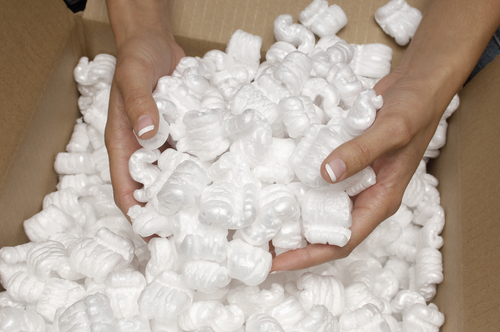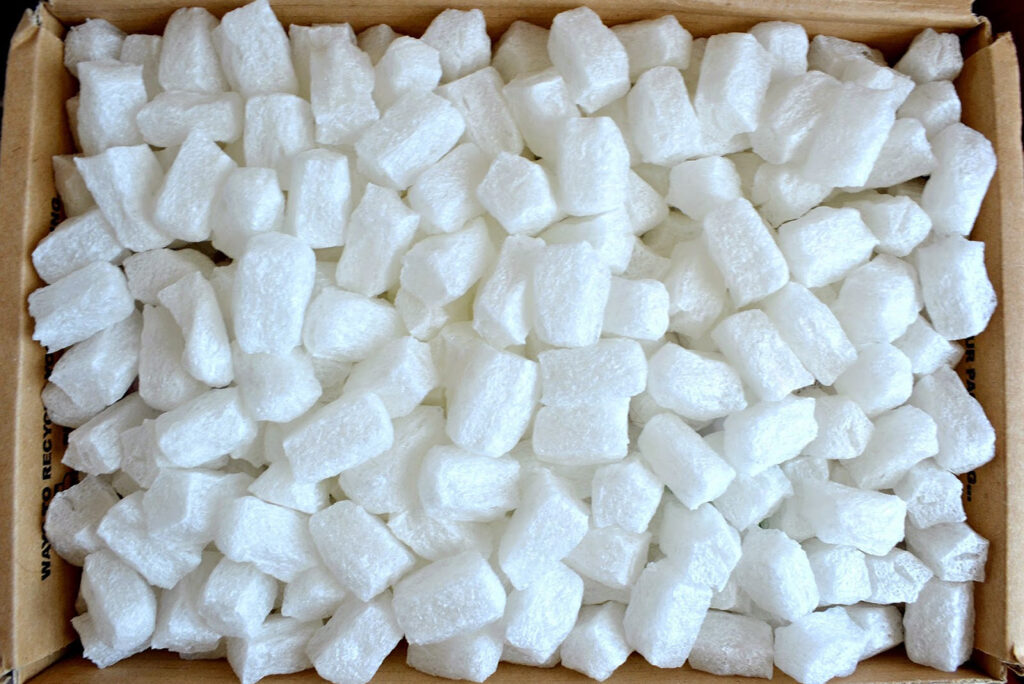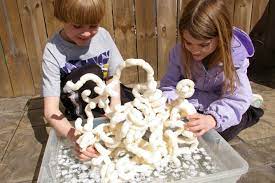After opening a package, the first thing you will notice is the fluffy, small objects that surround your product and protect it from any potential danger. In other words, packing peanuts is an interesting product itself. This light object not only protects items in the box but also keeps the product dust-free.
After the unpacking is done, you might wonder what you can do with the packing peanuts. Is packing peanuts edible? Well, it depends on the type of packing peanuts. There are both edible and harmful packing peanuts.
If you are interested in shipping or running a small business, then shipping materials is a must. To make your package safe and beautiful, packing peanuts will help you in more than one way. So, let’s learn about the types of packing peanuts and how you can use them and start your adventure.
Is Packing Peanuts Edible?

Whether the packing peanut is edible or not depends on the raw materials it is made of. You will find two types of packing peanuts on the market. One is synthetic-based packing peanuts, and the other is eco-friendly packing peanuts.
The eco-friendly packing peanuts are edible in a small amount. But if you eat the synthetic packing peanuts, that can be dangerous for your health and leave a long term effect.
Though you can eat starch-based packing peanuts, they are not food. If you eat a large quantity, you might get an upset stomach. The symptoms can be far more severe for children. Eating a few starch-based packing peanuts will not harm you, but you should be careful.
What Are The Ingredients Of Packing Peanuts?
There are mainly two types of packing peanuts based on their ingredients. You will find styrofoam packing peanuts and starch-based packing peanuts. Though starch-based packing peanuts are popular nowadays, you will still find styrofoam packing peanuts in some packaging.
- Synthetic packing peanuts are mainly made of styrofoam, polyester or other chemicals. These chemical ingredients are petroleum-based and dangerous for the environment.
- Nowadays, eco-friendly starch-based packing peanuts are popular because of their biodegradable and toxicity-free characteristics. These packing peanuts can be used freely without worrying about your pets or kids being sick. They are mainly made of grain, corn or plant-based starch. Also, they are very affordable and reusable for different purposes.
Can Packing Peanuts Be Toxic?

Yes, if your packing peanuts are not biodegradable and made of styrofoam, they can be toxic. To determine if your packing peanuts are toxic or not, you need to go through the materials.
Some packing peanuts are made of styrofoam, polystyrene and other synthetic chemicals that make them light and durable. But these materials can be very toxic. However, if you are using plant-based packing peanuts, they are not harmful for your body or environment.
How Can I Recycle Packing Peanuts?
If you have styrofoam packing peanuts in your possession, then it is better if you can recycle and reuse them.
Styrofoam packing peanuts do not dissolve easily and cannot be recycled at home. So reusing them is the best option for you. You can reuse them when you need to pack or store fragile objects. As recycling packing peanuts requires commercial facilities, you can resale the styrofoam packing peanuts to shipping companies.
But if you are using starch-based packing peanuts, you can dispose of them directly in the environment. They will not harm the environment and dissolve quickly.
Can Packing Peanuts Be Harmful To Kids?

Packing peanuts are not made for eating, so it can be harmful to your health, especially to kids. Children have a sensitive stomach. If they eat unpleasant food, it will harm their body.
If your kids eat styrofoam packing peanuts, that can be pretty contagious for their health. Synthetic chemicals are not good for health and can cause indigestion and other health issues. In the long run, it even can cause cancer.
But if it is starch-based packing peanuts, it will not be that much harm if they eat a few of them. However, eating a lot of them can give them an upset stomach.
What Are The Uses Of Packing Peanuts?
The primary purpose of packing peanuts is to protect fragile and valuable goods while transporting them. But after the product reaches its destination, these packing peanuts become useless. So, you can recycle them to make other things.
- You can reuse packing peanuts for storing and moving fragile items like glass. It will protect your products from any damage.
- The soft and squishy characteristics of the packing peanuts make them an exciting plaything for kids. You can use them to make some homemade toys.
- If the packing peanuts are eco-friendly, you can use them as fertilizer for your plants. They will be dissolved quickly, and the starch will help your plants grow.
Where Can I Find Sustainable Packing Peanuts?
Biodegradable and eco-friendly packing peanuts are replacing toxic items rapidly. You will find these sustainable packing peanuts in most shipping supply stores. In case you cannot find the product, you can ask the salesperson if the packing peanuts are available. You can pre-order them. You will also find these biodegradable packing peanuts online.
While placing your order, you need to check the ingredients and ensure that you are not buying synthetic ones. If the packing peanuts are starch-based, they are eco-friendly and easily disposable. As starch-based packing peanuts are becoming more common these days, it will not be difficult for you to find them.
Final Thoughts
Learning about the things you use will help you to protect yourself from any danger and get the most usefulness out of the product, especially if the product is something you frequently encounter, like packing peanuts.
Knowing about the dangers and uses of packing peanuts is necessary for every person. You might wonder about the properties of packing peanuts if you get to know about them for the first time. Is packing peanuts edible? Can it be harmful to children? And so on.
Knowing the answers not only fulfills your curiosity but also helps you to use them in a proper way. Use your knowledge and use your packing peanuts in a much more helpful way.